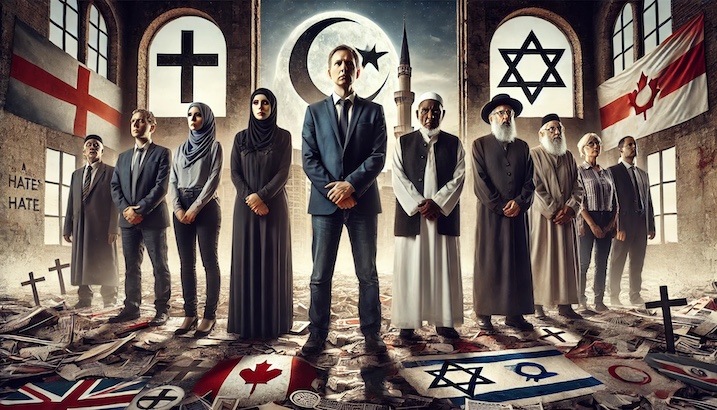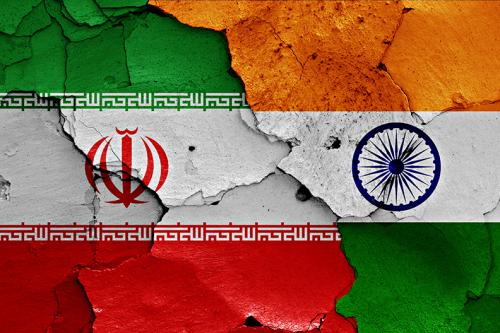Religious hate crimes have surged to unprecedented levels in England and Wales, reaching a record high in the year leading up to March 2024. This disturbing trend, revealed in the latest Home Office data, shows an alarming 25% increase in religiously motivated hate crimes compared to the previous year. In total, 10,484 incidents were reported, up from 8,370 in 2022-2023, marking the highest number of such offences since records began in 2012.
The Israel-Hamas conflict, which reignited in October of last year, has been cited as a major driving force behind this surge in hate crimes, particularly targeting Jewish and Muslim communities. Attacks on Jewish individuals more than doubled, with a staggering 3,282 reported incidents. Meanwhile, hate crimes against Muslims rose 13%, totaling 3,866 incidents.
The Impact of the Israel-Hamas War
The recent increase in hate crimes comes in the context of rising tensions following the Israel-Hamas war, which began in October 2023. The conflict has reverberated far beyond the Middle East, inflaming tensions across various communities in the UK. Both Jewish and Muslim organizations have expressed concern over the rise in antisemitism and Islamophobia in the aftermath of the war.
The Community Security Trust (CST), a charity dedicated to protecting the Jewish community, noted the sharp escalation in antisemitic attacks. “When the October 7 attack [by Hamas] happened, we knew immediately that there would be a rise in antisemitism, but the scale and the speed took us by surprise,” a spokesperson from the CST said. Jewish schools, synagogues, and community centers have all been targeted, causing fear and anxiety within these communities.
On the other side, Tell Mama, a project that tracks anti-Muslim abuse, has reported similar concerns. Iman Atta, the director of Tell Mama, highlighted that the data shows an increase in anti-Muslim hate crimes even before the anti-Muslim riots that took place over the summer. “The war on Gaza has left some questioning their safety and sense of belonging in the UK,” Atta remarked, pointing to the wider societal impact of the war on the Muslim community in Britain. This sense of unease has only been amplified by the far-right violence that followed, such as the Southport stabbing in July, which tragically claimed the lives of three children.
Rise of Far-Right Extremism
The rising tide of hate crimes is also intertwined with the resurgence of far-right extremism in parts of the UK. This movement, which has capitalized on social and political unrest, has amplified xenophobic rhetoric and stoked fear among minority communities. The violence in Southport, referenced by Iman Atta, is just one example of how the far-right has fueled hate crimes.
The attack in Southport, where three children were killed and eight others injured, shocked the nation. While the motives behind the attack are still being investigated, it has served as a catalyst for further acts of violence and hate against marginalized communities. This tragedy was followed by anti-Muslim riots and protests, exacerbating the already heightened sense of fear among Muslims in the UK.
Far-right groups have increasingly used online platforms to spread Islamophobic and antisemitic propaganda, often capitalizing on global events like the Israel-Hamas war to justify their views. The amplification of such narratives has contributed to the uptick in hate crimes, with social media acting as a breeding ground for hate speech and radicalization.
Government Response and Need for Action
The UK government has expressed its commitment to tackling the rise in hate crimes. Home Secretary Yvette Cooper condemned the surge in antisemitic and Islamophobic incidents, calling for a stronger response to combat the issue. “We must not allow events unfolding in the Middle East to play out in increased hatred and tension here on our streets, and those who push this poison — offline or online — must face the full force of the law,” Cooper said in a statement.
While the government has acknowledged the problem, there are growing calls for more robust and immediate action. Community leaders and advocacy groups have stressed the need for updated hate crime and social cohesion policies to address the evolving nature of religious and racial hatred in the UK. Iman Atta of Tell Mama emphasized the urgency of implementing these changes, especially in the wake of the summer riots and ongoing far-right violence.
Despite the record high in religious hate crimes, overall hate crime figures have slightly decreased from the previous year. The Home Office reported over 140,500 hate crimes in the year ending March 2024, down from 147,645 in the previous year. However, racially motivated hate crimes still make up the majority of these offences, accounting for more than two-thirds of all reported incidents.
Social and Cultural Implications
The rise in religious hate crimes underscores deeper social and cultural divisions in the UK, where communities are increasingly polarized. The Israel-Hamas conflict, while geographically distant, has had profound effects on public sentiment, particularly among Jewish and Muslim populations who feel directly impacted by the events overseas. The sense of fear and alienation within these communities is compounded by the broader societal challenges posed by far-right extremism and rising intolerance.
This climate of division has also highlighted the role of social media in spreading hateful rhetoric and misinformation. Platforms that fail to regulate content effectively have inadvertently become tools for the propagation of extremist views, leading to real-world consequences in the form of hate crimes and violence. The digital age has transformed the way hate is disseminated, making it easier for individuals to be radicalized and for extremist groups to coordinate and incite violence.
A Global Concern
The surge in religious hate crimes is a stark reminder of the dangers of unchecked hatred and intolerance. While the Israel-Hamas war has been a key trigger for this rise in the UK, the issue extends far beyond national borders. Across the world, rising tensions and global conflicts have led to an increase in religious and racial hostility. Communities in many countries are grappling with similar challenges as hate speech, extremism, and violence continue to grow. This is not a problem confined to one nation; it requires collective efforts to promote tolerance, understanding, and unity on a global scale.














